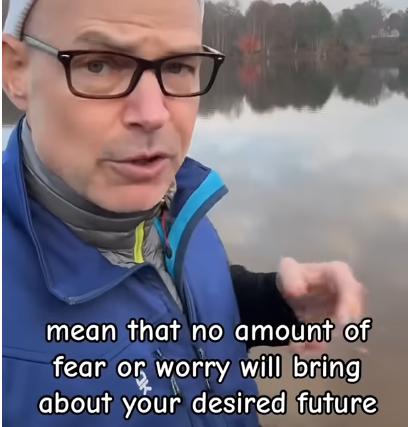On Acceptance (of emotions)
Self-help dude on YouTube, Michael Hunter, says:
"…no amount of fear or worry will bring about your desired future. No amount of regret will rewrite the past. Real peace, real growth, progress, they live in acceptance. What does that mean? It means accepting imperfection, embracing uncertainty, letting go of the need to control everything.

"Acceptance doesn’t mean you have to understand or tolerate or even forget something like forgive and forget.
"…the parts of you that hold fear, worry, self-doubt, and anxiety, these parts of you, they’re tying up your internal resources… they make you exhausted. When you learn to accept them, you transform them. … It’s in your body. An anatomical move. Start by feeling where in your body you feel the fear. For me, I feel fear in my belly. And you allow that feeling to be there. You actually welcome it. … That part of you will feel witnessed. It will feel seen. It won’t need to hold on to fear so tightly.
"The fear will drain away. You’ll literally feel a rise and fall of fear in your body. And when it falls away, you’ll feel refreshed, more whole, more integrated. You may have to do this with that part that holds fear every day.
"… Before long, fear won’t bring chaos into your life like it used to. No, instead you’ll come to see that fear part as a resource. Becomes like a little savings account of energy. Becomes this part of you that you can spend a moment with and afterward feel more energized, more whole, more integrated. That’s progress."
I think this is real and true. I’ve read this advice in many different forms from diverse sources and it matches my (limited) experience. Typically, when I just sit with bad feelings and don’t avoid them by distracting myself with something else, the feelings will stay for a little while, or even get temporarily worse, but the intensity eventually goes down. It can feel like torture to sit there with it, but it doesn’t actually take that long. The worse is usually over in less than a minute!
(I don’t know about the "savings account of energy" part, perhaps because I haven’t been doing this long enough.
By contrast, if I distract myself with something "fun" (which I won’t really enjoy, of course) and I don’t let the anxiety or irritation pass on its own, then I’m guaranteed to prolong the bad feeling. Yes, I get temporary relief, but that comes back as soon as the distraction is over and now I’ve wasted some time with a low-quality activity on top of it!
The solution, then, is to literally do nothing. Sit on my hands. Try to relax.
Avoiding mental discomfort with distraction is to follow this logic: "I’m going to cure this pain by sprinkling some avoidance and procrastination-based guilt on top of it!"
Why acceptance of bad feelings is so hard
"After the amygdala sends a distress signal, the hypothalamus activates the sympathetic nervous system by sending signals through the autonomic nerves to the adrenal glands… Pulse rate and blood pressure go up. … Small airways in the lungs open wide."
In other words, we’re not imagining this feeling I remember the last time I became upset about something trivial (because it was yesterday) and I became aware that my heart was beating faster.
"All of these changes happen so quickly that people aren’t aware of them. In fact, the wiring is so efficient that the amygdala and hypothalamus start this cascade even before the brain’s visual centers have had a chance to fully process what is happening. That’s why people are able to jump out of the path of an oncoming car even before they think about what they are doing."
And that’s why it’s so hard to change the stress response - it’s already happened before we even have a chance to think about it!
It makes sense, then, that the only thing to do is to give ourselves a chance to think (after the fact) and not react in the usual unproductive ways. It also makes sense that we can condition ourselves to respond differently and maybe avoid being so stressed in the first place.